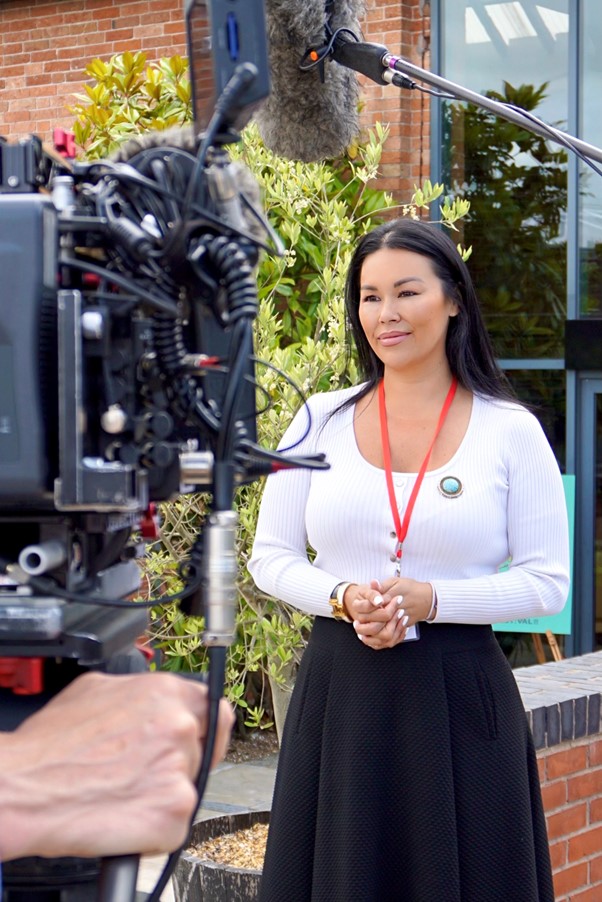The London Business News Magazine had the wonderful opportunity to speak to Gina Buckney, the founder and director of Your People Power, an organisation with a mission to reduce workplace stress.
Gina spoke with us openly about her personal burnout story, which led to her setting up Your People Power and becoming a passionate self-development author and speaker with a vision of supporting all businesses and workers to reduce stress levels and lead a healthy and balanced (work) life.
1. What was the trigger moment in which your organisation yourpeoplepower.org was born?
After an extreme burnout breakdown following the implementation of a significant technology transformation program, and 20 years of working in intense high pressured corporate environments of Financial Services and Telecommunications.
2. How did you overcome your burnout and set up your own business?
It didn’t happen overnight. For months I was extremely unwell and even depressed. Still, I had over a decade of meditation/mindfulness and self-development practices under my belt (although at my busiest times, I didn’t use them because I told myself I didn’t have the time).
Little by little, I created a new structure for myself, started journaling, and found this a form of therapy (because a strong woman like me didn’t like to talk to anyone about my issues). I started writing down things I was grateful for at the start and end of the day and documenting what made me feel stressed and what made me feel happy. After that, I did more of the happy things and less of the stressful things. I took time for myself to focus on looking after myself more.
Then, it was as though a switch flicked inside me, and I found a purpose once more, a new journey to embark on. I designed and published five self-help journals during the pandemic, filled with exercises that helped me overcome my depression and feel good again. I called them Journals for Life (as they literally saved my life). They are available globally on Amazon.

When designing the journals, the idea for Your People Power was born. I knew some of the colleagues I left behind would have been going through the same struggles as I did, plus many more corporate go-getters across the globe. In addition, the world wasn’t slowing down with the advancements in technology and digitalisation, so that resulted in humans working harder and longer hours to keep up.
For the last seven years, work-related stress and absenteeism have been on a rising trajectory, damaging businesses from the inside out and the people who work in them.
For things to change, we must change; for things to get better, we must get better, so that’s what I did. I educated myself once more, but this time in neuroscience with Harvard online during the pandemic, and the University of California, in Emotional Intelligence.
I knew, like computers (with my computer science background), that we had to find ways to reboot and recharge our brains, so we could work smarter, not harder. Increase focus, reduce working hours, improve memory to fight fatigue, and ultimately MAKE LIFE BETTER AT WORK for everyone. This idea materialised into a vision, which has now become my reality.
3. When people suffer from burnout who is to blame or what is the cause in your opinion?
It’s a difficult question because every circumstance is different, but I would say there are things that everyone can do better to prevent burnout. For example, I asked for help and support multiple times, but was I clear enough in my ask? Was I protecting my boundaries and saying no to things instead of always saying yes? (I was known to deliver, and my ego led me). Was I looking after the balance in my life when I was working online very late every night? The answer is no. Could I have done better? The answer is yes.
Could my employers/bosses have done better, absolutely, but I don’t blame them? We were all under pressure; they probably went through what I went through, but better with their boundaries.
I would say it’s about education on this topic. Spotting the signs, taking personal accountability, and supporting and looking after each other more is a win-win for everyone.
4. In your experience, how effective are employer interventions compared to employee interventions when faced with extreme burnout?
Culture has a part to play in this answer. However, if the culture and mindset are JFDI, and we must get this over the line for the shareholders, then interventions don’t happen on either side.
These are the organisations I must help with. It’s a deliver at all costs mindset, and we all buy into it, but that mindset can only take you so far until, like in the game of Jenga, everything becomes unstable, and we know what happens at the end of that game, don’t we?
5. Why is burnout becoming a more frequent phenomenon in our time despite all the technological advances that offer more convenience?
It’s a compounded effect over time, with the numbers increasing yearly. When one person goes off sick, what usually happens? Their work is passed to the other team members until they come back, or a replacement is fully trained.
Imagine that problem constantly exacerbating without a reverse trend. Therefore, it is a CRITICAL ISSUE for any organisation now. Furthermore, technological advancements have increased the issue somewhat, as we are in constant AGILE change and development, always having to adapt and learn new skills and systems whilst continuing to operate our day jobs.
Social media hasn’t helped with the desire for the perfect lifestyle; we find ourselves comparing and wanting an easier life. Finally, the pandemic had the same effect; people questioned if there is more to life than work and if they need a slower pace to be happy.
As I say, it’s a compounded impact of many different things.
6. How do you make sure you reach the right people that would benefit from learning your so-called “power skills”?

Well, I continue to do what I do best now, sharing my story and education with as many people as possible who work in these pressure cooker environments. The right people will hear me, and maybe even read this article, feel synergy in my story, and relate to what I have said. If they do, I urge them to contact their HR teams and ask them to look into this and the growing importance of these skills to help them thrive at work and survive in THE NEW NORMAL.
7. Since its inception what has your organisation achieved?
We have shared fundamental knowledge and education with some of the biggest global brands, from Microsoft to BASF, to Amazon, to Johnson and Johnson, not to mention many financial services corporations.
Leading companies are always a step ahead of the rest; these businesses understand the issue and are acting now.
We have also developed a 24/7 SASS system, THE POWER BANK, on which companies can purchase employee seats. It is a workplace performance and wellbeing hub, filled with online education and practical exercises ad a community hub area where people can share their experiences.
8. What business challenges have you faced with yourpeoplepower.org?
I think my own personal transformation; it’s a journey, and it doesn’t happen overnight, but luckily with my background in global change delivery, I had the tools to help me work through them.
Also, I was told when I started that the UK wasn’t ready for this type of thing. So I’d now ask, are you sure? The time is now.
9. Who would benefit from working with yourpeoplepower.org and why?
Any organisation that values its people and their knowledge base, people are assets, just like IT applications and infrastructure. So we have to value, protect, and maintain them. Also, organisations who work under pressure to stay in the game and companies who want staff to work at their optimum performance.
Finally, an effective workplace wellbeing program can reduce your sunken people costs by up to 33%; so, if you suffer from high absenteeism and turnover costs, here is a solution.
10. Would you have turned to yourpeoplepower.org when you experienced extreme burnout and what difference would it have made to your life?
Oh my goodness, if I’d had access to some of the fun and educational initiatives that YPP offers organisations, I honestly believe I would not have reached burnout and would have been more productive.
We promote many initiatives, from brain training, energy boosting, stress releasing exercises, and pet therapy.
Find more information here:
Website: www.yourpeoplepower.org
Email: support@yourpeoplepower.org
Instagram: ginabuckney /Your People Power
LinkedIn: ginabuckney/Your People Power
Watch Gina’s TEDx Talk: https://www.youtube.com/watch?v=KXooXXC8omw
Author Profile

- Online Media & PR Strategist
- As the Chief of Marketing at the digital marketing agency ClickDo Ltd I blog regularly about technology, education, lifestyle, business and many more topics.
Latest entries
 EntertainmentJuly 18, 2025London’s Swinger Scene Summer Trends Revealed: Swinging Cruises, Roadside Diners & Digital Swinging
EntertainmentJuly 18, 2025London’s Swinger Scene Summer Trends Revealed: Swinging Cruises, Roadside Diners & Digital Swinging Health & BeautyJuly 16, 202513 Iconic London Tattoo Shops with Tattoo Artists Celebrities Trust
Health & BeautyJuly 16, 202513 Iconic London Tattoo Shops with Tattoo Artists Celebrities Trust DictionaryJuly 4, 2025Spa Etiquette Guide: Essential Tips for London and UK Luxury Spas
DictionaryJuly 4, 2025Spa Etiquette Guide: Essential Tips for London and UK Luxury Spas BusinessJune 30, 20254 Affiliate Marketing Trends Every London Business Should Watch In 2025
BusinessJune 30, 20254 Affiliate Marketing Trends Every London Business Should Watch In 2025


